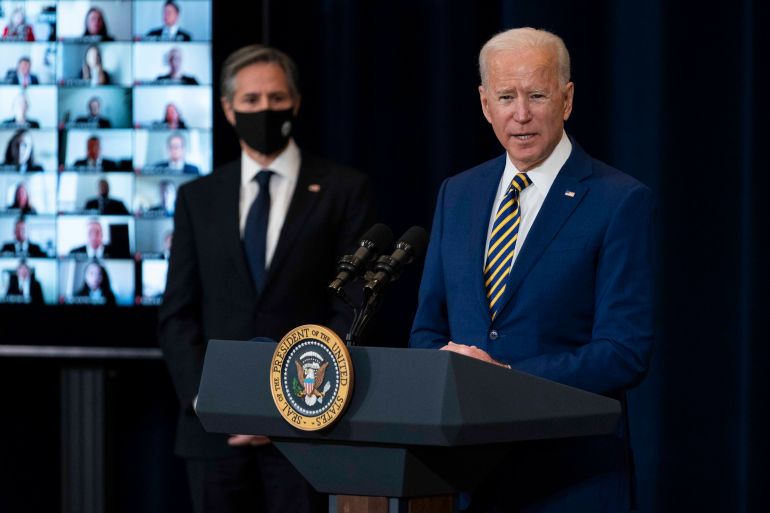The Biden administration can make a difference in the Middle East
But only if it abides by these four principles when putting together its foreign policy towards the region.

The floodgates of unsolicited foreign policy advice for the Biden administration are now wide open. Some sensible individuals offer useful suggestions. However, much of the advice is coming from former US government officials who participated in creating the very foreign quagmires they now audaciously propose to fix. Their policy prescriptions often reflect a serious lack of understanding of international issues that prioritises agendas pushed by domestic and foreign lobbies and narrow US goals over effective diplomacy.
I prefer to stay out of the policy advice game, and instead, only highlight a few enduring principles that might be useful in strengthening any major power’s foreign policy. This applies mostly to governments whose aggressive policies in the Middle East, defined by militarism, threats, sanctions, muscle-flexing, and self-congratulatory delusions of divinely sanctioned exceptionalism, have proven to be counterproductive and even dangerous.
Keeping in mind the history of American and European colonial powers’ domination of the region, I suggest four principles that would allow US foreign policy to make a difference and help resolve some of the crises the region faces.
The rule of law
Foreign policy towards the region must show respect for the international rule of law. Foreign powers create their own rules for how they behave in our region. They tend to ignore international law and norms when it suits them because they feel that power overrides rules and they have more power than Middle Eastern states.
This applies to military assaults, like the wars in Iraq, Yemen, Libya, and Syria. It is also valid when principles, such as freedom of speech, individual rights, nuclear non-proliferation, international justice and the right to anti-colonial struggle, have to be upheld. Today, for example, the entire world is watching closely the proceedings at the International Criminal Court regarding war crimes allegations in Israel and Palestine to see if international legal norms and accountability mechanisms are applied equally to Arabs and Israelis.
The arbitrary violation of international laws and rules by foreign powers has created so many of the crises the Middle East currently suffers from. To alleviate them international rule of law must be upheld.
Equal rights for Arabs and Israelis
Over the past century, in Western foreign policy towards the region, Israeli rights and aggressive Zionist ideology have enjoyed priority over Palestinian and Arab rights. Britain’s criminal duplicity, deception, and self-serving colonialism of 1915-1948 set the stage for a cruel century of Western powers consistently acquiescing to Zionist demands while trampling over Arab rights. This allowed the Zionist project to establish full control over historic Palestine, despite the fact that at the turn of the century Palestinian Arabs owned and inhabited 93 percent of its land.
If this principle continues to shape US and other foreign policies in our region, we can only expect continued popular resentment and resistance against both foreign powers and complicit Arab leaders.
It is time that the West understand that there is no need to continue this skewed policy because the Arab countries have all clearly and repeatedly expressed their willingness to coexist in peace and equality with a Jewish-majority Israel. The door to a negotiated permanent peace agreement is before us all, if only all sides viewed Arabs and Israelis as equal.
Only stick, no carrot
Militarism, sanctions, and threats have increasingly become the main instruments of policy-making towards the Middle East, while dialogue, diplomacy, and compromise have often remained on the back burner. Because of its enormous military power, Washington is inclined to use it as a primary policy instrument.
But the high human cost and military failures of the wars in Afghanistan, Iraq, Syria, Yemen, Libya, and Somalia, as well as the global “war on terror”, have demonstrated how ineffective brute force can be in resolving conflict. Military assaults, threats, and sanctions have wreaked havoc and instability in the region and deepened and prolonged its many crises.
By contrast, the successful negotiations that resulted in the Iran nuclear deal during the Obama administration remind us how effective serious diplomacy and mutual respect can be in resolving disputes and regional tensions.
The rights and needs of citizens
For far too long Western foreign policy towards the region has ignored the rights, needs, and sentiments of the Middle East’s ordinary citizens. Instead, it has solely engaged the elites, enriching them and serving their narrow clientelist interests.
If Arab citizens are treated as invisible people who have neither voice nor legitimacy, it should not be surprising that these same hundreds of millions of men and women support and partake in the ongoing uprisings across the region to evict their ruling elites.
The events of the past two decades confirm that as the majority of people steadily become poorer, more vulnerable, marginalised, and helpless, they ultimately turn against their leaders who are responsible for their plight. The rupture between citizens and most Arab governments is a recent, post-1980s, phenomenon, and it continues to worsen.
This has frightened some Arab leaders who are now embracing Israel as a way to secure American support and protection. Foreign powers which embrace corrupt and inefficient Arab leaders and promote normalisation of Arab-Israeli ties before the Palestinians secure their rights harm the wellbeing and trample the dignity of hundreds of millions of Arab citizens. This is a sure recipe for disaster.
If the Biden administration wants to leave a positive mark on the history of this region, it should learn the lessons of past failures and overhaul American foreign policy to affirm law, diplomacy, respect, and equality. These principles define the foundations of American life and democracy. They should also shape its foreign policy towards the Middle East and the rest of the world.
The views expressed in this article are the author’s own and do not necessarily reflect Al Jazeera’s editorial stance.
